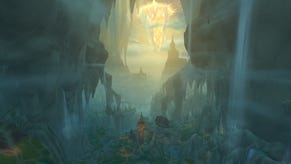Unity interview: engineering democracy
Unity is at the centre of an indie development revolution. VG247's Dave Cook speaks with CEO David Helgason about empowering indies, and the significance of Unity on Wii U.
Founded in 2004 by David Helgason, Nicholas Francis, and Joachim Ante, Unity started life as an indie game studio. Like other indies, it faced the hidden dangers and challenges that come with being a small fish in an industry dominated by blood-thirsty sharks.
However, Unity only released one game, and quickly realised that something was rotten in the state of development. Helgason and his team set off to create a tool-set that would empower indies at a cost anyone could afford. That engine was Unity.
Today, Unity is fast becoming the development platform of choice for indie studios, bedroom coders and students, giving anyone with a bright idea the chance to go to market.
It's a revolution we haven't seen since the days of garage devs making their own games on cassette or floppy disc. Invention is in the air, and it feels good at a time when the almighty dollar hangs over the industry like a dagger waiting to drop.
Unity is the engine leading this charge, and now that the company has partnered with Nintendo to bring Unity to Wii U, the cost of entry to becoming a console developer is about to drop considerably. We're on the cusp of something big, and you should be excited.
So we spoke to the man behind the engine, David Helgason, in an attempt to better understand what the industry is facing, and why indies should be empowered, rather than stripped for cash at every turn.
VG247: Looking at the industry as it stands now, and looking forward over the next five years, it's never been so uncertain just what will happen. We have new emergent marketplaces, digital content streams and more. Where do you see Unity fitting into all of that going forward?
David Helgason:That's a tough question actually. There have been many transitions in the industry – the switch to social, the switch to online gaming and mobile – are not the first big changes. We've also seen a switch to casual games, and before that you had consoles, which were a shift from PC.
We're moving at a speed that is ridiculous, and the markets are so big now that there is just so much money to be made. Of course that gets split amongst all of the market players, it's not a 'winner takes all' situation.
But that's another transition, because the console world didn't begin like that. Back then you had very few games that made all the money and everything else was either failing, or falling behind. Now it's a market where that doesn't happen, which is amazing.
The big transitions today are things like the switch to mobile, and then there are smaller ones which are like the switch to iPhone or Android specifically. It's really hard for studios to keep up with technology, and it's even worse for smaller studios.
”When Unity started we were going to make games, so we started life as a small studio, and I think that’s why we understand the needs of small studios.”
That's because while they can be agile, they don't have the manpower to throw at porting engines, building infrastructure and so on. So the quicker the transition, the more people need technology,
And that's where Unity comes in?
Well, Unity wasn't created for this evolution. In fact, if you look back eight years ago, we weren't making an engine. But we quickly realised that small and medium-sized developers should be well served, and we really care about them.
When Unity started we were going to make games, so we started life as a small studio, and I think that's why we understand the needs of small studios to do well. So we started making technology that was focused on helping small - and later medium – sized developers, and now very big, grandiose, awesome games.
It just so happened that we were ready for when the big transitions started, so you might say that transition need technology. We can't claim that we started this revolution, but once it started happening, all the small developers had access to Unity, what you might call, 'nuclear arms' technology [laughs].
What I mean by that is it helps power their games ,and when you look at the top-selling iPhone games today – well, last time I checked – three of those games were made with Unity. One was done by a small company called Boss Alien.
They're not exactly a 'basement' developer, but not what you'd call a small group either. Then of course Rovio, which has always been an indie company that just turned big. I don't know how many staff they had when they made Angry Birds, but now they use Unity for Bad Piggies, and I'm sure other games down the line.

Unreal Engine 4 is one of Unity's main competitors in the triple-a market.
What's interesting there is when you said 'transition needs technology', because we've seen Unreal Engine 4 and Luminous, which are attempts by their respective developers to fuel the next generation cycle in a big leap. However, Unity seems to be a more iterative engine that constantly evolves along a neat curve.
When you look at iPhone or Android devices, it's almost a yearly thing. There are many new devices each year, but few new leaps in power. The power of these devices steps up every few months, but only by 30%, not by the several hundred per cent you get with each console cycle.
That process calls for a different style of engine that really focuses on iteratively moving, but the mobile devices are moving so fast now, to the point that they're surpassing the last generation of consoles.
So we've also had to step up our game, and we've been hiring a ridiculous number of incredibly qualified game engine engineers, including guys who have worked on Frostbite, Glacier 2, and a number of other high-end engines.
We believe that we have to follow that transition and basically be the engine of choice for 2D games done by, say, two students in a basement, and serving 50-100 people building games for the Wii U – we just announced support for that – and even the next generation of mobile devices.
Being able to do all of this is really hard, but it's possible by adding a lot of extra work and focus, then simplifying what is possible, while still having advanced technology to build high-end games.
We can only do this because of economics, because the mobile explosion happened so quickly that, we became boosted by an influx of people buying our tools, so now we can re-invest all of those resources as best we can.
I liked the analogy about two students in a basement making a game, because it has become much easier for indies to get products to market – and Unity is a big part of that. Was it always your aim to support the 'little guy', as it were?
Not from 'day zero', because we were going to be a game studio, but when we decided we'd be a technology company back in 2004, we basically wrote on the wall that we wanted democratise game development – to enable small studios with whatever high-end technology they felt was necessary for them.
Of course we were not able to do this from the get-go, because back then we were just three guys in a basement. There was no way we could have matched technology that had existed for ten years at the time, and at the time things went slowly.
There were only so many people who could actually buy our stuff, because even though Unity is cheap, and it's still the same cheap price, there just wasn't a lot of people doing what we were catering for.
So we had to kind of build things up for five years. We had customers back then, and we had adoption, but it was just kind of slow. However, the goal has always been the same in that we wanted Unity to be extremely awesome and extremely simple to use, while keeping the price down.

The Unity 4 demo shows a man having the worst day ever. It's impressive.
It's impressive that costs have been kept down while the tool-set continues to expand.
Well now with some of the new stuff we're doing, like our particle system Shuriken, our animation engine Mecanim – which in many cases is better than anything out there, or at least matching the best in-house engines.
It doesn't mean that Unity is far behind those engines, because we are getting there. Of course we also see some of the games that are in development that studios haven't announced – I mean, it's big stuff, and there will be some awesome, really big titles launching next year.
But again, the same technology is available to really small studios, and the neat thing is that the tech includes high-end particles, high-end animation, detailed rendering, high-end shaders, DirectX 11 support, advanced audio systems.
”Everyone expects the next generation to be even more open, although all three big console developers have been quiet on that. Our expectation is that they will be more open, and if we can benefit from that, then smaller developers definitely will.”
Small studios may not have the manpower to use all of these elements while making a game, but they can pick and choose whatever they want for their productions, and it enables them to work faster and – ultimately – make better games.
What I like about Unity is that it's a form of empowerment. If these indies tried going down another route, they may be stone-walled at the first turn. One thing we hear a lot of is that publishing on platforms like Xbox Live or PSN can be costly, while Unity has easier deployment methods. Should Microsoft and Sony reconsider their approach to the 'little guys'?
To be fair to them, approvals on those formats is not that easy, but it doesn't have to be hard if the developer has a really interesting concept that they latch on to. We've seen small games from teams that don't have much of a background – not proven teams – come out on those platforms.
Standards must be stricter because they need to know that this game is going to work – through approvals, techincal testing – which can be really expensive, and could be made a lot cheaper with Unity.
But to be fair, these platforms have been opening up more and more, so the current status of those platforms is way more open than the previous generation was. I think everyone expects the next generation to be even more open, although all three big console developers have been quiet on that.
Our expectation is that they will be more open, and if we can benefit from that, then smaller developers definitely will. It's been proven very clearly on App Store – on iOS – that not all of the hits, but many of them are by companies that started out as very small studios.
It's like Rovio, they had built like 80 mobile games – maybe I'm getting the number wrong – but a s**t-ton of games.
Yeah, it took years of releases before Rovio finally landed a hit with Angry Birds.
Exactly, and you see a lot of studios starting to gain this momentum today. I expect that – and I can't say who or how because the stuff I know is all secret – but I do expect some formats, or all of them to open up more.
Wii U is – of course – now supporting Unity, so that could be the start of a bigger presence for the engine in the mainstream console market. How did that deal come about, and how will Nintendo use Unity moving forward?
It's actually been a dream of ours to be the default development kit for something you can access if you're just building games for a particular console. I remember we pitched the idea to at last Nintendo, but also Sony maybe five years ago, but of course back then we were a tiny company, and we didn't have a lot of users.
So, it was understandable that they didn't bite back then, although I think they should have, because the tools were really good back then, but they weren't yet proven. We didn't have 1.2 million registered users, or 200,000 monthly users back then – we probably had closer to 200.
”Nintendo will take Unity tools that we give them, and bring it to their big ecosystem of studios. Nintendo has first-party, third-party and all of the other studios that they’ve worked with for years, and they know them well. They trust them because they know how to make awesome games for Nintendo platforms.”
Our prowess grew very quickly thanks to the explosion of mobile, and that helped us grow our user base and improve our tools. I can't describe the exact steps we took with Nintendo, but we were in touch with them, and in the end they may have even come to us. I can't remember the exact steps.
We were over in Japan last year with our really good tech people who are famous in the Japanese industry, such as Shinobu Toyoda, who was the American CEO of Sega. He is very well connected. So we led the charge on this partnership – we were excited about it, as were Nintendo.
From then on we negotiated a bunch of stuff, like who would do what and when. I think it's interesting because we're still working on tools that mean you can take a version of Unity and export it to the Wii U. It's not done yet, but we know it's going to get done soon.
It's going well, and we're firing along with that project. Once that's done, two things will happen, and these are separate things, but I think they are connected and they will work really well together.
One thing is that Nintendo will take Unity tools that we give them, and bring it to their big ecosystem of studios. Nintendo has first-party, third-party and all of the other studios that they've worked with for years, and they know them well.
They trust them because they know how to make awesome games for Nintendo platforms. Historically, none of these companies were using Unity, and they have the same challenges as everybody else – cost effective development and all that stuff.
So Nintendo is bringing Unity to these studios so they can build with it. The second thing that will happen is that, we turn around with the same tools and technology we're working on, and take them to our community, which is a different one.
Nintendo's community is very formidable and respected, they've been around for a long time. We turn to our community which is new, very energetic – of course we have old studios, but there are a lot of young ones too – and many of them have built games for consoles before.
But many more have never built console games, or published on any console. What is exciting there is that are many studios out there that make hit games on iOS, Android or Steam, but hopefully many of these studios will be able to bring their games to Wii U, and that's just really exciting.
If the Wii U is – and we hope it will be – a big success, then that will be a big deal for a lot of those developers.










_ddwYK80.png?width=291&height=164&fit=crop&quality=80&format=jpg&auto=webp)


